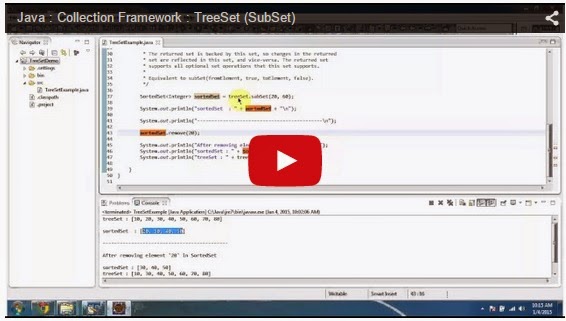Click here to watch in Youtube :
https://www.youtube.com/watch?v=522UUKEPhkE&list=UUhwKlOVR041tngjerWxVccw
TreeSetExample.java
Output
https://www.youtube.com/watch?v=522UUKEPhkE&list=UUhwKlOVR041tngjerWxVccw
TreeSetExample.java
import java.util.SortedSet; import java.util.TreeSet; /* * Example of subSet(E fromElement,E toElement) method. */ public class TreeSetExample { public static void main( String[] args ) { TreeSet<Integer> treeSet = new TreeSet<Integer>(); treeSet.add(40); treeSet.add(20); treeSet.add(30); treeSet.add(10); treeSet.add(50); treeSet.add(60); treeSet.add(80); treeSet.add(70); System.out.println("treeSet : " + treeSet + "\n"); /* * Returns a view of the portion of this set whose elements range from * fromElement, inclusive, to toElement, exclusive. (If fromElement and * toElement are equal, the returned set is empty.) * * The returned set is backed by this set, so changes in the returned * set are reflected in this set, and vice-versa. The returned set * supports all optional set operations that this set supports. * * Equivalent to subSet(fromElement, true, toElement, false). */ SortedSet<Integer> sortedSet = treeSet.subSet(20, 60); System.out.println("sortedSet : " + sortedSet + "\n"); System.out.println("--------------------------------------------\n"); sortedSet.remove(20); System.out.println("After removing element '20' in SortedSet \n"); System.out.println("sortedSet : " + sortedSet); System.out.println("treeSet : " + treeSet + "\n"); } }
treeSet : [10, 20, 30, 40, 50, 60, 70, 80] sortedSet : [20, 30, 40, 50] -------------------------------------------- After removing element '20' in SortedSet sortedSet : [30, 40, 50] treeSet : [10, 30, 40, 50, 60, 70, 80]
https://sites.google.com/site/javaee4321/java-collections/TreeSetDemoSubset.zip?attredirects=0&d=1
See also:

.jpg)
No comments:
Post a Comment